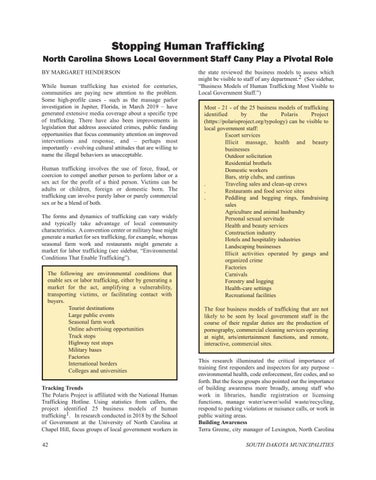Stopping Human Trafficking
North Carolina Shows Local Government Staff Cany Play a Pivotal Role
BY MARGARET HENDERSON
While human trafficking has existed for centuries, communities are paying new attention to the problem. Some high-profile cases - such as the massage parlor investigation in Jupiter, Florida, in March 2019 – have generated extensive media coverage about a specific type of trafficking. There have also been improvements in legislation that address associated crimes, public funding opportunities that focus community attention on improved interventions and response, and – perhaps most importantly - evolving cultural attitudes that are willing to name the illegal behaviors as unacceptable.
Human trafficking involves the use of force, fraud, or coercion to compel another person to perform labor or a sex act for the profit of a third person. Victims can be adults or children, foreign or domestic born. The trafficking can involve purely labor or purely commercial sex or be a blend of both.
The forms and dynamics of trafficking can vary widely and typically take advantage of local community characteristics. A convention center or military base might generate a market for sex trafficking, for example, whereas seasonal farm work and restaurants might generate a market for labor trafficking (see sidebar, “Environmental Conditions That Enable Trafficking”). The following are environmental conditions that enable sex or labor trafficking, either by generating a market for the act, amplifying a vulnerability, transporting victims, or facilitating contact with buyers. Tourist destinations Large public events Seasonal farm work Online advertising opportunities Truck stops Highway rest stops Military bases Factories International borders Colleges and universities
Tracking Trends The Polaris Project is affiliated with the National Human Trafficking Hotline. Using statistics from callers, the project identified 25 business models of human trafficking1. In research conducted in 2018 by the School of Government at the University of North Carolina at Chapel Hill, focus groups of local government workers in 42
the state reviewed the business models to assess which might be visible to staff of any department.2 (See sidebar, “Business Models of Human Trafficking Most Visible to Local Government Staff.”) Most - 21 - of the 25 business models of trafficking identified by the Polaris Project (https://polarisproject.org/typology) can be visible to local government staff: Escort services Illicit massage, health and beauty businesses Outdoor solicitation Residential brothels Domestic workers Bars, strip clubs, and cantinas . Traveling sales and clean-up crews . Restaurants and food service sites . Peddling and begging rings, fundraising sales Agriculture and animal husbandry Personal sexual servitude Health and beauty services Construction industry Hotels and hospitality industries Landscaping businesses Illicit activities operated by gangs and organized crime Factories Carnivals Forestry and logging Health-care settings Recreational facilities
The four business models of trafficking that are not likely to be seen by local government staff in the course of their regular duties are the production of pornography, commercial cleaning services operating at night, arts/entertainment functions, and remote, interactive, commercial sites.
This research illuminated the critical importance of training first responders and inspectors for any purpose – environmental health, code enforcement, fire codes, and so forth. But the focus groups also pointed out the importance of building awareness more broadly, among staff who work in libraries, handle registration or licensing functions, manage water/sewer/solid waste/recycling, respond to parking violations or nuisance calls, or work in public waiting areas. Building Awareness Terra Greene, city manager of Lexington, North Carolina SOUTH DAKOTA MUNICIPALITIES










